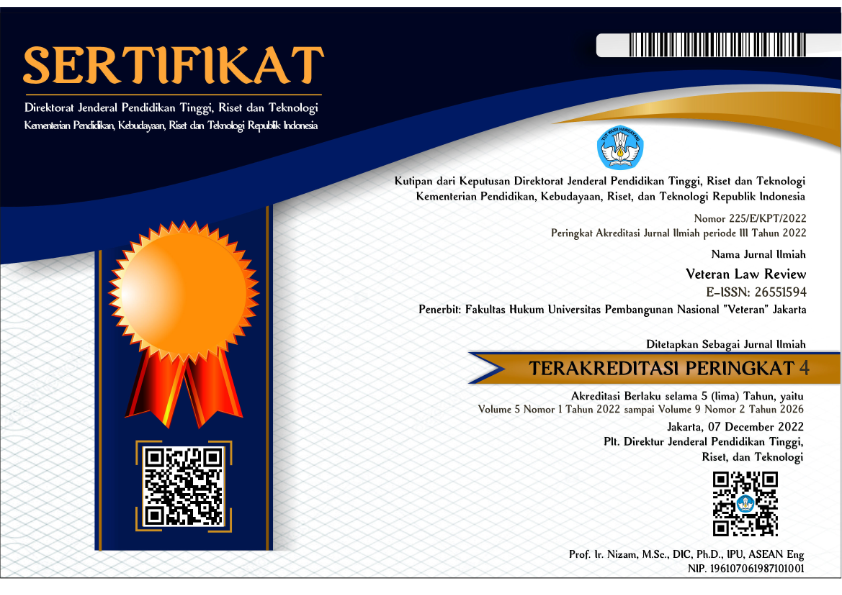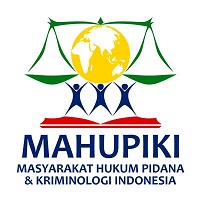Corporate Crime in Smuggling Illegal Foreign Workers in Indonesia
DOI:
https://doi.org/10.35586/velrev.v6i2.6390Keywords:
Corporate Crime, Smuggling, Foreign, workerAbstract
The globalization era facilitates the mobilization of workers across borders, resulting in the influx of foreign workers (TKA) into Indonesia. The employment of TKA aligns with the nation's goals of enhancing investments, technology transfers, and expertise to Indonesian Citizen Workers (TKI) while broadening employment prospects. Per the Job Creation Law No.11 of 2020, Article 45 paragraph (1) stresses the necessity of assigning TKI as companions for foreign workers. This mandate emphasizes training to facilitate technology and skill transfer from foreign workers to TKI companions. Employing the standard legal approach, this study aims to evolve legal theories through a rigorous scientific process. It involves scrutinizing legal documents to explore the regulatory framework and theories relevant to contemporary issues. Utilizing a descriptive analytical method, this research interprets and correlates legal statutes and theories with present concerns. Findings, employing a deductive approach, point to the classification of illegal foreign workers and the necessary sanctions for companies involved in illegal labor trafficking. Illegal foreign workers breach migration regulations, while companies partaking in unlawful labor trafficking face stringent penalties like imprisonment, fines, and license revocation. This study underlines the imperative to enforce legal measures to curb illegal labor practices and protect the nation's labor integrity.
Downloads
References
Adha, Lalu Adhi, Lalu Husni, and Any Suryani. “Kebijakan Penggunaan Tenaga Kerja Asing Di Indonesia.” Jatiswara 31, no. 1 (2016): 161–76.
A.Patra, M.Zen, “Kejahatan Korporasi dan Norma tentang Akuntabilitas Korporasi Kejahatan korporasi”, YLBHI Kejahatan Korporasi.
Ali, Zainuddin. Metode Penelitian Hukum. Sinar Grafika, 2021.
Asikin, Zainal. “Pengantar Metode Penelitian Hukum,” 2016.
Fithri, Nur Hidayatul. “Kesejahteraan Dan Penerapan Keadilan Bagi Pekerja Dalam Undang-Undang Cipta Kerja Klaster Ketenagakerjaan.” Wijaya Putra Law Review 1, no. 2 (2022): 120–29.
Giyono, Urip, and Ratna Puspitasari. “KAJIAN ETNISITAS DAN KETENAGAKERJAAN TERKAIT PERATURAN PRESIDEN NOMOR 20 TAHUN 2018 TERHADAP MASUKNYA TENAGA KERJA CHINA DI INDONESIA.” Jurnal Jendela Hukum 9, no. 1 (2022): 34–51.
Hanafi, Perkembangan Konsep Pertanggungjawaban Pidana dan Relevansinya Bagi Usaha Pembaharuan Hukum Pidana Nasional, (Jakarta: Tesis, Program Pascasarjana, Universitas Indonesia, 1997)
Hamidi, Jazim, and Charles Christian. Hukum Keimigrasian Bagi Orang Asing Di Indonesia. Sinar Grafika, 2021.
Marshall B. Clinard dan Peter C. Yeager, Corporate Crime, (New York: The Free Press. A Division of Macmillan Publ, 1980)
Napitupulu, Wilson Petrus. “Analisis Terhadap Tindak Pidana Penyeludupan Manusia Keluar Negeri Untuk Bekerja Sebagai TKI Illegal Di Wilayah Hukum Polres Bengkalis.” Universitas Islam Riau, 2020.
Nurhidayati, Nurhidayati. “Perizinan Tenaga Kerja Asing, Kebijakan Dan Implementasinya.” Jurnal Khatulistiwa Informatika 3, no. 2 (2019): 241–48.
Purwati, Ani. “Metode Penelitian Hukum Teori & Praktek.” Jakad Media Publishing, 2020.
Shanty, Lilik. “Aspek Teori Hukum Dalam KEJAHATAN KORPORASI.” PALAR (Pakuan Law Review) 3, no. 1 (2017).
Simanungkalit, Henni Indriani. “Pertanggungjawaban Pidana Pelaku Orang Yang Melakukan Penempatan Tenaga Kerja Migran Indonesia Tanpa Ijin (Studi Putusan Pengadilan Nomor: 1074/Pid. SUS/2018/PN. Mdn),” 2020.
Wilson Petrus Napitupulu, “Analisis Terhadap Tindak Pidana Penyeludupan Manusia Keluar Negeri Untuk Bekerja Sebagai TKI Illegal Di Wilayah Hukum Polres Bengkalis” (Universitas Islam Riau, 2020).
Zulkarnain, “Hambatan Penegakan Hukum Terhadap Pelaku Kejahatan Korporasi Dalam Sistem Peradilan Indonesia”, (Menunggu Peran Mahkamah Konstitusi dalam Upaya Pemberantasan Kejahatan Korporasi), Jurnal Konstitusi, (Volume IV, Nomor 2, November 2011).
Downloads
Published
How to Cite
Issue
Section
License
Copyright (c) 2023 Veteran Law Review

This work is licensed under a Creative Commons Attribution-ShareAlike 4.0 International License.
Copyright (c) 2022 Veteran Law Review Journal
Veteran Law Review © 2022 by Faculty of Law Universitas Pembangunan Nasional "Veteran" Jakarta is licensed under Creative Commons Attribution 4.0 International

1. License
The non-commercial use of the article will be governed by the Creative Commons Attribution license as currently displayed on Creative Commons Attribution 4.0 International.
2. Author(s)' Warranties
The author warrants that the article is original, written by the stated author(s), has not been published before, contains no unlawful statements, does not infringe the rights of others, is subject to copyright that is vested exclusively in the author, and free of any third party rights, and that any necessary written permissions to quote from other sources have been obtained by the author(s).
3. User/Public Rights
VELREV's spirit is to disseminate articles published are as free as possible. Under the Creative Commons Attribution-ShareAlike 4.0 International License. VELREV permits users to copy, distribute, display, and perform the work for non-commercial purposes only. Users will also need to attribute authors and VELREV to distributing works in the journal and other media of publications.
4. Rights of Authors
Authors retain all their rights to the published works, such as (but not limited to) the following rights;
- Reproduce the work
- Prepare derivative works based upon the work
- Distribute copies of the work
- Perform the work publicly
- Display the work publicly
- Copyright and other proprietary rights relating to the article, such as patent rights,
- The right to self-archive the article,
- The right to enter into separate, additional contractual arrangements for the non-exclusive distribution of the article's published version (e.g., post it to an institutional repository or publish it in a book), with an acknowledgement of its initial publication in this journal (Veteran Law Review).
5. Co-Authorship
If the article was jointly prepared by more than one author, any author submitting the manuscript warrants that he/she has been authorized by all co-authors to be agreed on this copyright and license notice (agreement) on their behalf, and agrees to inform his/her co-authors of the terms of this policy. VELREV will not be held liable for anything that may arise due to the author's internal dispute. VELREV will only communicate with the corresponding author.
6. Royalties
Being an open accessed journal and disseminating articles for free under the Creative Commons license term mentioned, author(s) are aware that VELREV entitles the author(s) to no royalties or other fees.
7. Miscellaneous
VELREV will publish the article (or have it published) in the journal if the article’s editorial process is successfully completed. JOSI's editors may modify the article to a style of punctuation, spelling, capitalization, referencing, and usage that deems appropriate. The author acknowledges that the article may be published so that it will be publicly accessible and such access will be free of charge for the readers as mentioned in point 3.

















